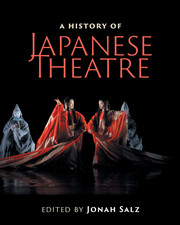Book contents
- Frontmatter
- Contents
- List of figures
- List of tables
- Contributors
- Contributors’ biographies
- Foreword
- Acknowledgments
- Note on Japanese terms
- List of abbreviations
- Timeline
- Editor's introduction
- I Traditional theatres
- Preface to Part I Japanese civilization arises
- II Modern theatres
- Preface to Part II
- 6 Birth of modern theatre: shimpa and shingeki
- Interlude Modern comedies and early musicals
- Interlude Takarazuka: all-girls’ revue and musicals
- 7 Rise of shingeki: Western-style theatre
- Interlude Manzai and Yoshimoto vaudeville comedy
- 8 Wartime colonial and traditional theatre
- Interlude Kami-shibai: picture-card storytelling
- 9 Maturing shingeki theatre
- Interlude Postwar musicals and commercial theatre
- 10 Sixties Theatre
- Interlude Butoh: dance of darkness and light
- 11 Contemporary theatre
- Interlude Tokyo: world theatre capital
- Interlude Charting Tokyo theatre today: 24 November 2012
- Interlude Modern theatre tomorrow: interview with Oriza Hirata
- III Arcs and patterns
- IV Theatre architecture
- Preface to Part IV Evolution of Japanese theatre architecture
- V Theatre criticism
- VI Intercultural influences
- Epilogue: Frozen words and mythology
- Further reading
- Index
- References
8 - Wartime colonial and traditional theatre
from Preface to Part II
Published online by Cambridge University Press: 05 July 2016
- Frontmatter
- Contents
- List of figures
- List of tables
- Contributors
- Contributors’ biographies
- Foreword
- Acknowledgments
- Note on Japanese terms
- List of abbreviations
- Timeline
- Editor's introduction
- I Traditional theatres
- Preface to Part I Japanese civilization arises
- II Modern theatres
- Preface to Part II
- 6 Birth of modern theatre: shimpa and shingeki
- Interlude Modern comedies and early musicals
- Interlude Takarazuka: all-girls’ revue and musicals
- 7 Rise of shingeki: Western-style theatre
- Interlude Manzai and Yoshimoto vaudeville comedy
- 8 Wartime colonial and traditional theatre
- Interlude Kami-shibai: picture-card storytelling
- 9 Maturing shingeki theatre
- Interlude Postwar musicals and commercial theatre
- 10 Sixties Theatre
- Interlude Butoh: dance of darkness and light
- 11 Contemporary theatre
- Interlude Tokyo: world theatre capital
- Interlude Charting Tokyo theatre today: 24 November 2012
- Interlude Modern theatre tomorrow: interview with Oriza Hirata
- III Arcs and patterns
- IV Theatre architecture
- Preface to Part IV Evolution of Japanese theatre architecture
- V Theatre criticism
- VI Intercultural influences
- Epilogue: Frozen words and mythology
- Further reading
- Index
- References
Summary
The lead-up to World War II (sometimes referred to as “the Fifteen-Year War”) dates back to the “Manchurian Incident” of 1931, but Japan's aggressive expansionist activities originated much earlier. Japan abandoned its centuries-old exclusionary policies with the arrival of Commodore Perry's “Black Ships” in 1853; other ambitious European powers soon followed. Inspired by the large-scale expansionism of the West during the late nineteenth century, Japanese imperialists realized as early as 1874 – when they gained control of the Rbl>yūkyūbl> Islands from China – that Japan could supplement its limited natural resources and fortify its defenses by gaining control of weaker Asian entities.
Military strength allowed for Japanese territorial expansion. In 1876, Japan forced Korea to concede special trading privileges; the Sino-Japanese War (1894–5) brought about the annexation of Formosa (Taiwan) and other valuable territories from China. The need to eliminate Russia as a competitor for power in Asia led to the Russo-Japanese War (1904–5). Japan's conclusive victory allowed it to acquire Guandong (Kwantung) Leased Territory and Karafuto (South Sakhalin). The way was thus cleared for the annexation of Korea in 1910, making Japan a major world power. In 1914, the Japanese Navy seized Nan'yo (Micronesia) from Germany under the terms of the South Pacific Mandate.
Japan's presence spurred the economic development of its new colonial territories, including railways, bridges, and other infrastructure that could bring Japan precious raw materials. However, it also imposed severely repressive colonialist controls, with Japanese military administrators keeping indigenous people in strict subjugation while the authorities, emulating Western colonial policies, existed in an elite Japan-centric society. Development of the colonized territories included both agricultural improvements and investment in heavy industry; education of both Japanese settlers and the local population was also a priority, with an emphasis on Japanese curricula, including teaching of the Japanese language.
- Type
- Chapter
- Information
- A History of Japanese Theatre , pp. 251 - 263Publisher: Cambridge University PressPrint publication year: 2016



